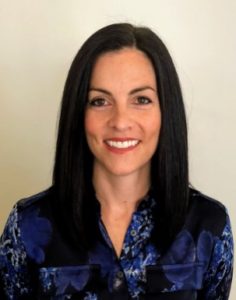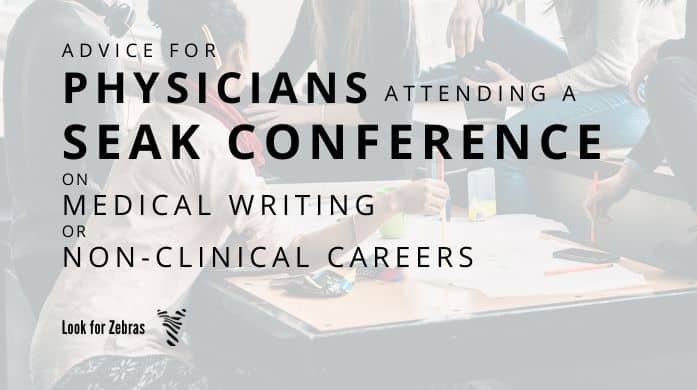Published by Lookforzebras
- 1. Make sure you’re running TO something, not running AWAY from something
- 2. Do some homework first
- 3. Have an open mind
Editor’s note: I’m thrilled to have another guest post from medical writer and physician coach, Dr. Mandy Armitage (check out her previous post on Look for Zebras about getting into medical writing). Many readers have questions about attending a SEAK conference as a part of their exploration of non-clinical careers. Dr. Armitage – who has been both a SEAK speaker and mentor – has some great advice.

About the author:
Mandy Armitage, MD is a board-certified physician with several years of medical communications and health tech start-up experience. She enjoys coaching physicians who are interested in transitioning into medical writing. To learn more, please visit her website.
Many readers interested in non-clinical work are probably familiar with the organization SEAK. For those who aren’t familiar, SEAK is an educational company with a focus on “teaching physicians how to supplement their clinical income through lucrative home-based work and educating physicians about the numerous non-clinical career options available to them,” among other things.
I’ve been working with SEAK now for several years, and over time I’ve noticed some trends among physician attendees. As such, I thought it might be helpful to offer some advice to those who are interested.
I will start by pointing out that SEAK offers many opportunities for physicians, but I can only speak to those with which I have experience. These include the annual non-clinical careers conference in Chicago (speaking and mentoring), and the annual writing workshop in Clearwater Beach (teaching). Here is a description of each, in case you’re not familiar:
- Annual conference: Again, this is held in Chicago every October. This is a great opportunity to hear from physicians in all types of non-clinical careers. Several physicians are also available as mentors, and you can book 15-minute time slots with them to ask questions, learn about their positions/companies, network, etc.
- Writing workshop: “How to Earn Money as a Physician Writer” is held every February in Clearwater Beach. The teaching faculty includes me, Sorche Fairbank (literary agent), and Jim Mangraviti (Principal of SEAK and author). We discuss topics like how to self-publish, how to pitch a book idea, and how to find freelance writing work. It’s a smaller, more intimate setting that allows for great conversation and sharing of ideas.
The following is my advice for physicians thinking about or planning to attend a SEAK event:
1. Make sure you’re running TO something, not running AWAY from something
For those seeking a non-clinical career, this is huge. At the larger conference, I’ve increasingly noticed that attendees are more and more disenchanted with their ‘day jobs.’ This is understandable, given the current landscape. While I can certainly empathize with that state of mind, I think it’s important to address, because I wouldn’t encourage anyone to make a rash decision about changing careers. Yes, it’s important to seek better work-life balance, autonomy, flexibility, and the list goes on. But it’s also important to take your time finding out exactly what that looks like. The last thing you want is to rush into something new that might end up making you miserable again, but for different reasons.
It’s great that there are now so many resources available to physicians considering something non-clinical, but the decision shouldn’t be made lightly or abruptly. If this sounds familiar, you may want to consider working with a career coach. That’s what I did when I started looking at non-clinical options, and I found it to be truly helpful.
2. Do some homework first
While this is not necessary, it may give you a leg up when you attend a conference or workshop. For example, if you plan to attend the large non-clinical careers conference in October, read and reread the brochure before you go. Presentations and mentoring sessions are running concurrently, so it will benefit you to have a plan in place. I’ve heard from several people who didn’t get to attend a talk or two because they didn’t plan well enough. I’ve also talked to folks who were disappointed when they didn’t get a mentoring slot with me because my schedule filled up before they had a chance to book one (there are lots of folks interested in medical writing!). It’s really important to know ahead of time which presentations you’d like to attend and which mentors with whom you’d like to schedule a session.
This is less important for the writing workshop, but it still helps to review the agenda ahead of time. This will help you know which sessions you absolutely can’t miss (if, for example, you’ve got to make an important phone call in the middle of the day). It will also help you time your questions more appropriately and keep the course on track, which the other attendees will appreciate. Lastly, it will help you get more out of the course. Typically, the attendees at the writing workshop are in various stages of their writing careers: many are just starting out, but some already have written feature articles or books. I am happy to teach all levels, because I’ve been at square one before, and I remember feeling quite lost. But I think attendees may get more out of the workshop when I can get into the nitty-gritty of freelance medical writing without first explaining exactly what it is.
3. Have an open mind
I know what it’s like to feel ‘stuck’ on a certain path or in a less-than-desirable situation. But, trust me, there are so many opportunities available for physicians that don’t involve clinical practice. Don’t sell yourself short. You’ve worked hard to get where you are, and you can work just as hard on your side gig or next move. Also, don’t discount any of the opportunities that are out there until you really do your research. You might not think you’re suited for writing or consulting or whatever it is, but it helps to open your mind to different possibilities.
In summary, I think SEAK offers great tools and resources for physicians who are considering side gigs or non-clinical careers. But as a speaker and mentor, I obviously have a much different perspective than a first-time attendee. So if you know anyone who has attended, I encourage you to ask for that person’s opinion and advice. If you don’t think you know anyone who has attended, I encourage you to ask around. You might be surprised by who else is looking!


I did not know you held a conference in Clearwater in February. How do I get on a mailing list?
SEAK’s email list sign-up can be found here: https://seak.com/join-mailing-list/